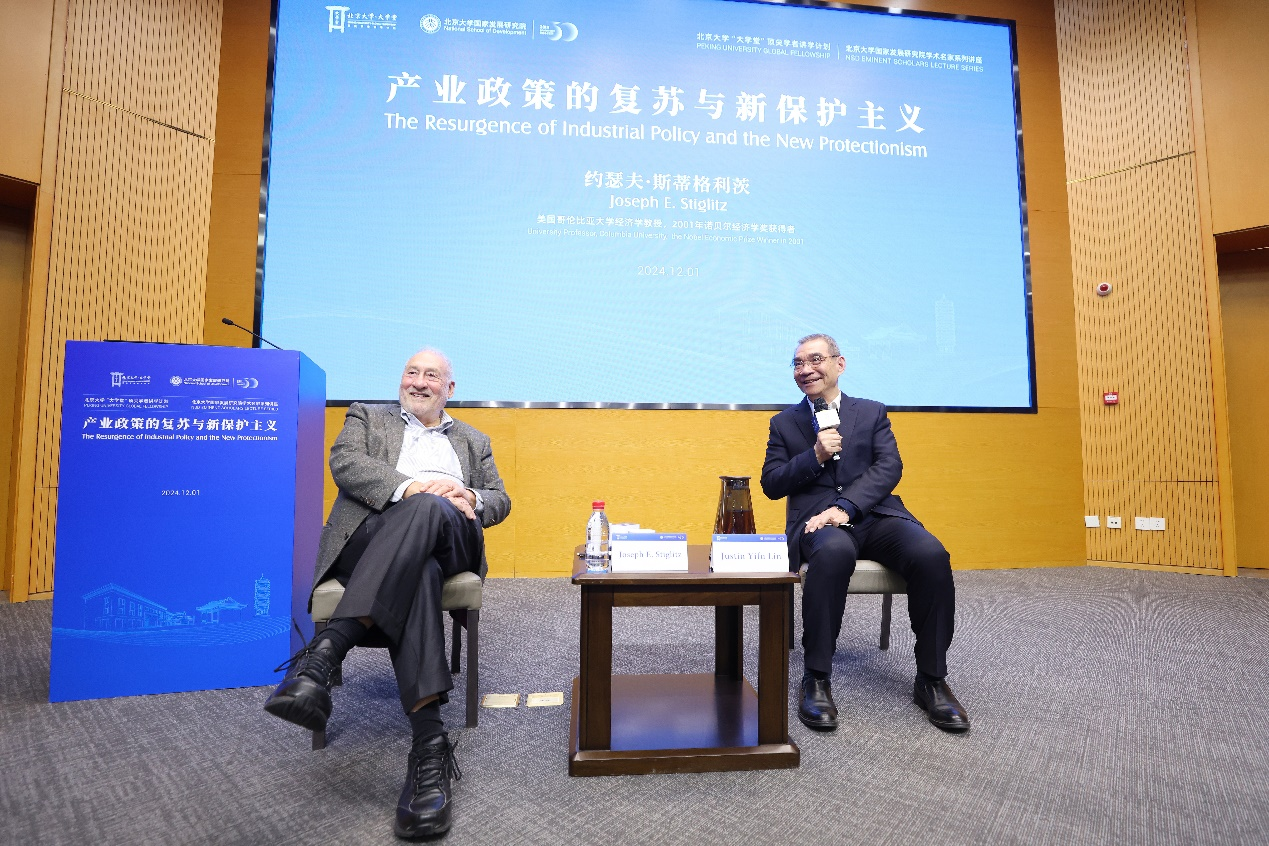
On December 1, 2024, Joseph E. Stiglitz, Professor of Economics at Columbia University and the Nobel Economic Prize Winner in 2001, delivered a lecture titled The Resurgence of Industrial Policy and the New Protectionism . This event was part of Peking University Global Fellowship and NSD Eminent Scholars Lecture Series. The lecture was commented by Justin Yifu Lin, Dean of the Institute of New Structural Economics, Honorary Dean of the National School of Development, Peking University, and hosted by Yiping Huang, Dean of the National School of Development, Peking University.

Joseph E. Stiglitz was born in Gary, Indiana, in 1943. A graduate of Amherst College, he received his PhD from MIT in 1967, became a full professor at Yale in 1970, and in 1979 was awarded the John Bates Clark Award, given biennially by the American Economic Association to the economist under 40 who has made the most significant contribution to the field. He has taught at Princeton, Stanford, MIT and was the Drummond Professor and a fellow of All Souls College, Oxford. He is now University Professor at Columbia University in New York. He is also the Co-Founder and Co-President of the Initiative for Policy Dialogue at Columbia and Chief Economist of the Roosevelt Institute. In 2001, he was awarded the Nobel Prize in Economics for his analyses of markets with asymmetric information, and he was a lead author of the 1995 Report of the Intergovernmental Panel on Climate Change, which shared the 2007 Nobel Peace Prize. In 2011, Time named Stiglitz one of the 100 most influential people in the world.
During the lecture, Stiglitz highlighted the critical factors behind the resurgence of industrial policy. The COVID-19 pandemic and geopolitical crises exposed significant vulnerabilities in global supply chains and revealed the limited production capacity for essential goods in Western economies. In addition, the urgent threat of climate change underscored the inadequacies of market mechanisms in addressing systemic issues. These challenges manifested the market's inability to resolve complex socioeconomic issues, thus reemphasizing the importance of industrial policy in contemporary policy agendas.
Stiglitz revisited traditional free trade theories, critiquing their static assumptions and failure to account for the dynamic effects of knowledge and learning. Through a global dynamic general equilibrium perspective, he demonstrated that free trade, in the absence of effective knowledge transfer mechanisms, could slow global economic growth and exacerbate inequalities. He explained that while knowledge tends to spread across sectors within a country, its cross-border diffusion is often hindered. Countries with even slight initial comparative advantages in manufacturing sector can benefit from cumulative learning-by-doing effects, solidifying their lead over time. In contrast, other nations would slide into "knowledge impoverishment" and productivity stagnation. Over the long term, an unfettered free trade system is not always the optimal choice for global welfare, and developing countries need industrial policies to achieve economic catch-up.

To address these challenges, Stiglitz called for a fundamental rethinking of international trade rules. He emphasized the need for mechanisms to facilitate cross-border knowledge sharing and technological collaboration while preventing outcomes that replicate the neocolonial pattern. He argued for the integration of industrial policy with climate change initiatives and the enhancement of supply chain resilience. Furthermore, he advocated for providing developing countries with improved access to technology and resources to promote equitable development.

Justin Yifu Lin expressed his gratitude for Stiglitz's thought-provoking presentation. They engaged in in-depth discussions on the resurgence of industrial policy and protectionism, the interplay between trade and technological change, and the implications of theoretical models for economic policy conclusions. Stiglitz highlighted that globalization and automation have together reduced demand for low-skilled labor in the United States, intensifying unemployment and inequality. He noted the importance of combining theoretical models with empirical evidence to make informed policy decisions. Reflecting on his earlier engagements with Chinese policy discussions, Stiglitz commended China’s openness to diverse perspectives, attributing this inclusivity to its developmental success.

Stiglitz's lecture offered profound insights into the future of industrial policy and global trade, sparking engaging discussions on knowledge spillovers, international rules, and sustainable development. The event inspired scholars and students alike to further explore these critical issues, laying the groundwork for impactful research and policy innovation.